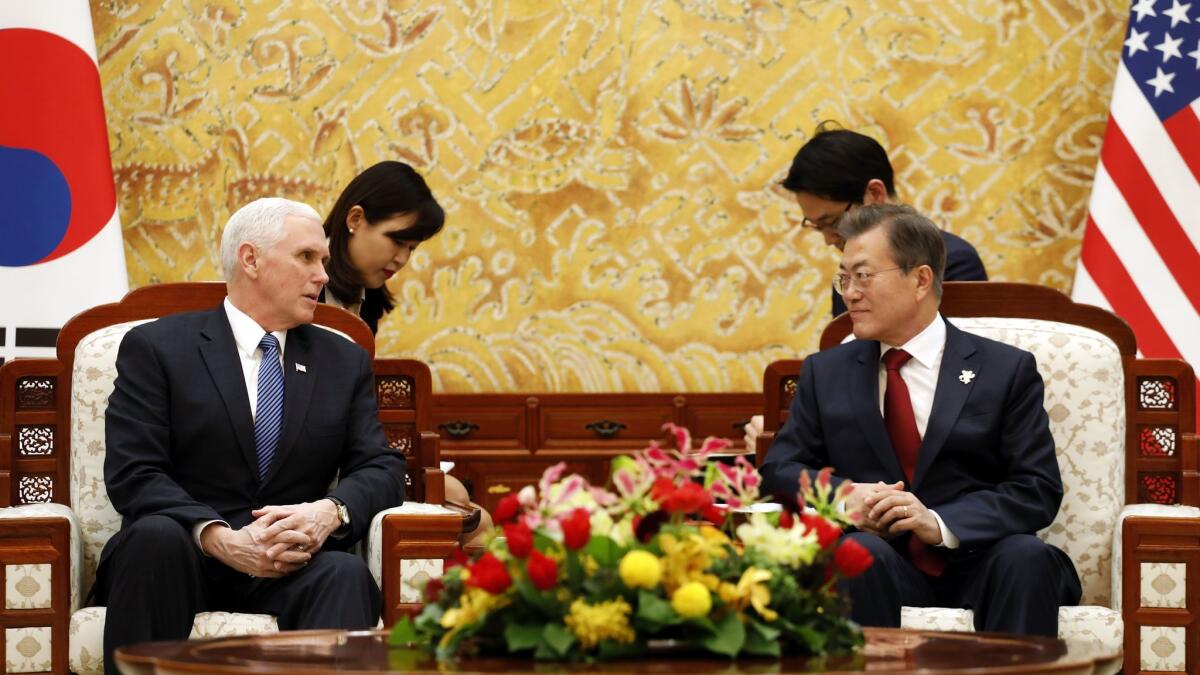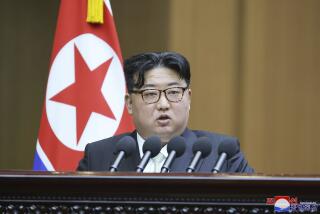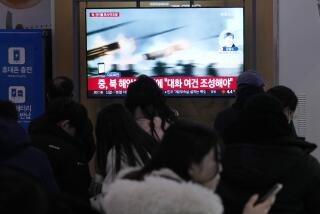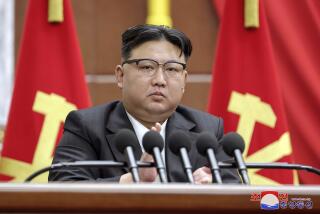Pence urges North Korea to abandon ‘long pattern of deception’ in its quest for nuclear arms

With a diplomatic deal securing its spot in the Winter Olympics, North Korea successfully changed the international narrative away from its illicit pursuit of nuclear weapons and long-range ballistic missiles.
Events on Thursday may have refreshed some memories.
Vice President Mike Pence arrived in Seoul on Thursday determined to remind the world about the North’s advancing weapons capability — a theme the totalitarian nation helped advance by staging a large military parade in the streets of Pyongyang.
A day after suggesting that new sanctions might be imposed, Pence said the Trump administration would still press to isolate the North diplomatically and economically after the Olympics if, as expected, it continues advancing as a nuclear-armed state.
“The time has come for North Korea to abandon its nuclear and ballistic missiles ambitions, set aside this long pattern of deception and provocation and then — and only then — can we begin to move forward to a peaceable outcome on the peninsula,” Pence told reporters traveling with him on a two-nation trip to Asia.
The vice president met Thursday evening with South Korean President Moon Jae-in, who has embraced the recent diplomatic thaw with the North as a first step toward reducing military tensions on the peninsula.
The North and South, once countrymen, have remained divided more than six decades after the Korean War. Moon’s government hopes the Games might help decrease tensions on the peninsula, which have worsened in recent years as the North defied the international community in its weapons effort.
Pence, who earlier Thursday spoke publicly to troops in Japan during a visit in which he met with Prime Minister Shinzo Abe, didn’t take questions after the event with Moon. He did affirm the “strong and unbreakable” bond between the allies before dining with Moon.
“It is our great honor to be here at the Blue House in the Republic of Korea to reaffirm the strong and unbreakable bond between our two nations,” he said after signing a presidential guestbook.
Pence was expected to attend the Olympics opening ceremonies on Friday evening in Pyeongchang, South Korea. The vice president said earlier in the day that he remained open to the possibility of meeting with the North Korean delegation, though the North declined the overture in its state-controlled media.
Thursday’s events came as the North’s Olympics charm offensive continued and as the remaining details of its official participation became clear.
Kim Yo Jong, the only sister of the North’s leader, Kim Jong Un, now plans to attend the Olympics ceremony as part of a nearly two-dozen-strong government delegation. The group is set to meet with Moon on Saturday.
The announcement about Kim Jong Un’s sister, thought to be an influential member of the North’s leadership, came as a 140-member orchestra from Pyongyang performed Thursday night in Gangneung, a South Korean city hosting indoor events such as skating and hockey.
The musical troupe’s performance is one of the cultural events the North requested during negotiations last month. The two nations also agreed to march together during opening ceremonies and to field a joint women’s ice hockey squad — the first-ever unified Korean team in Olympics history.
The North is also sending a taekwondo performance team to the South as well as a large cheering squad, part of the terms it negotiated in return for sending athletes to the Games.
It’s precisely these kind of events, which spotlight the North’s culture, not just its military-first ideology, that Pence aims to counter as “propaganda” on his visit.
“It appears Washington is trying to prevent Pyongyang from stealing the spotlight at Pyeongchang — which is exactly what the North is aiming to do — by emphasizing the regime’s human rights abuses and showing that Washington remains tough even though Seoul is showing flexibility,” said Duyeon Kim, a visiting senior fellow at the Korean Peninsula Future Forum.
Duyeon Kim said she expects the North’s presence at the Games — and the sheer size and novelty of its delegation — will still capture plenty of attention in the next few weeks. She also expects the North to return to its confrontational posture after the sporting events conclude, postponing a potential confrontation by the Trump administration.
Pence’s effort to keep that spotlight on the North’s provocative behavior includes adding to the delegation the father of Otto Warmbier, an American college student who died last year shortly after being released in a coma after months in North Korean custody.
The cause of his death remains uncertain, but the North’s critics have seized on Warmbier’s detention on a tourist trip — the accusations against him also aren’t certain — as an example of its human rights abuses.
The Pence visit — as well as Pyongyang’s decision to hold a military parade on Thursday — raised the specter of politics clouding what some in South Korea have dubbed the “Peace Olympics,” given the North’s decision to participate and field the hockey team with the South.
Thursday’s military parade in Pyongyang had been anticipated for weeks by security experts who have studied commercial satellite imagery that appeared to show preparations at an airfield in the capital. The event, attended by Kim Jong Un, included mass displays of troops, mobile artillery, tanks and the Hwasong-15, an intercontinental ballistic missile test-launched in November that’s capable of reaching the U.S. East Coast.
A mass of participants held signs in red and yellow spelling “Final Victory” in Korean as the missiles — perched on mobile launchers — passed through a main square, according to footage from Korean Central Television.
North Korea watchers said the parade is likely an effort by Kim to project the nation’s military might to a domestic audience, even as it has shown diplomatic flexibility in negotiating terms for the Olympics with Seoul.
“He wants to show that, even though he’s asked South Korea to be allowed to join in on the Olympic Games, nobody should get the wrong idea,” said Grant Newsham, a former diplomat who is a senior research fellow at the Japan Forum for Strategic Studies.
“The parade demonstrates to the world — and his favorite enemies — that he really is a tough guy and not to be trifled with, even if he’s playing nice during the Olympic games.”
Stiles is a special correspondent.
More to Read
Start your day right
Sign up for Essential California for news, features and recommendations from the L.A. Times and beyond in your inbox six days a week.
You may occasionally receive promotional content from the Los Angeles Times.







